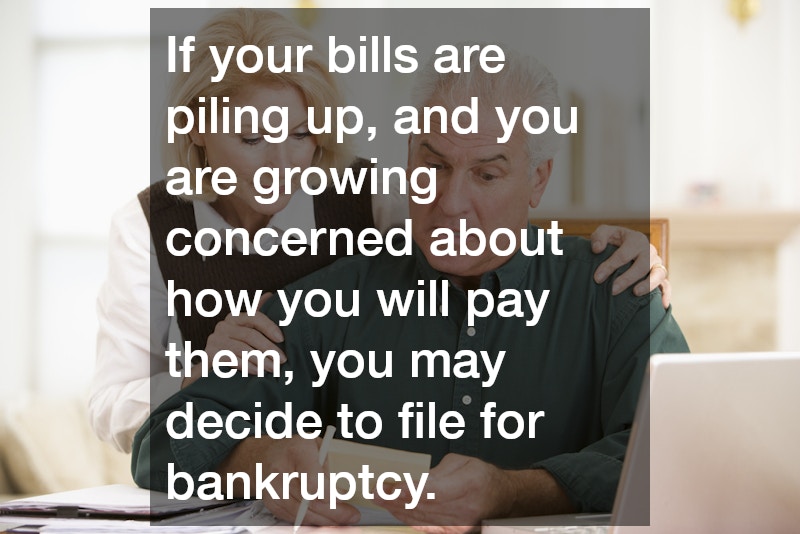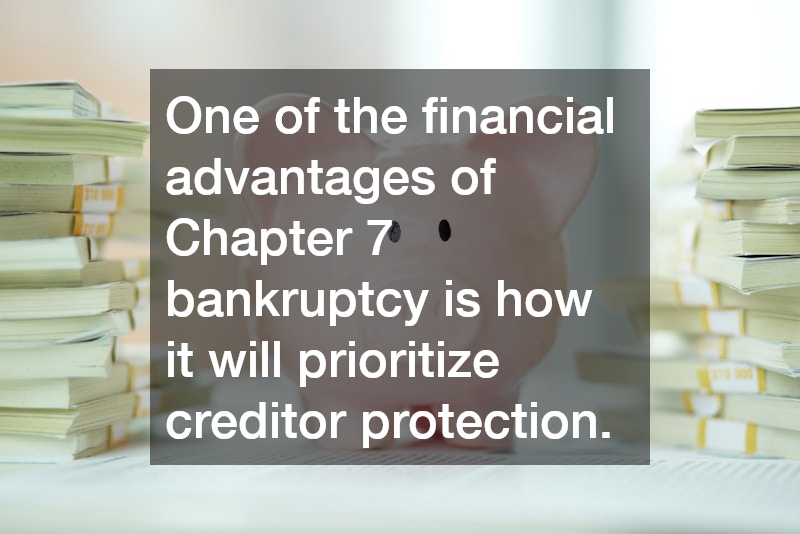
If your bills are piling up, and you are growing concerned about how you will pay them, you may decide to file for bankruptcy. According to Investopedia, a Chapter 7 bankruptcy will require you to sell all your nonexempt assets, and then you will use that money to pay your debts. Chapter 7 exempt assets include your car, your home, and any retirement accounts you might have. This type of bankruptcy will also allow you to keep household belongings, burial plots, and health items.

Bankruptcy proceedings may become complicated, and it is typically best to work with a Chapter 7 bankruptcy attorney during your bankruptcy proceedings. After you file for Chapter 7, you will be required to compile a schedule of assets and debts. This record will help form a strategy for how to gain funds to settle your debts.

One of the financial advantages of Chapter 7 bankruptcy is how it will prioritize creditor protection. According to Investopedia, this refers to stopping any further collection efforts by your creditors. As for keeping track of the sale of your nonexempt assets, your lawyer may direct you to a liquidation trustee.

Do you have questions about how to file for chapter 13 bankruptcy or other debt relief services and options that might be available to you? If so, you need to talk to your local financial law firm and get in touch with an attorney who can give you a crash course in bankruptcy 101 and answer your questions. Economic woes have become more severe and more common for many people today, so the need and interest in bankruptcy filing have increased significantly. Talking with a local attorney can help determine if that is the right choice for you and your unique situation.
These legal pros can answer any questions you have about bankruptcy and filing taxes, bankruptcy and student loan repayment, and even the process of getting bankruptcy debt forgiveness. If you have questions and want to learn more about bankruptcy and what it might be able to do for you, call your local financial law firm today to get started. They will walk you through the process and help you understand your rights, responsibilities, and options.

Updated 4/11/22.
Declaring businesses or individuals bankrupt when they cannot pay their debts helps resolve financial difficulties. The bankruptcy law definition holds that individuals who cannot meet their financial obligations, including debt repayment, may file for bankruptcy to reestablish their financial position. This enables them to rebuild their lives and credit positively.

A court may be hesitant to declare bankruptcy without a lawyer, stressing the importance of getting legal counsel before filing for bankruptcy. Bankruptcy lawyers provide legal services and complimentary financial counseling to clients undergoing bankruptcy to assist them in managing their lives and paying off their debts.

Before contacting a lawyer, one of the first things you should do is check bankruptcy filings in your state to determine the requirements for declaring bankruptcy. After filing for bankruptcy, a debtor in bankruptcy case complications may be able to improve their credit scores. Bankruptcy provides significant relief to debtors facing foreclosure, utility shutoff, and eviction by allowing them to start over.
Additionally, declaring bankruptcy prevents creditors from suing, threatening, or contacting you. However, you may repay some of your dischargeable debts after filing for bankruptcy.

You have probably heard that bankruptcy can harm your credit. You may be prevented from taking out any additional loans for many years. You may not be able to obtain a mortgage or a rental agreement. It will be difficult to get a loan on a vehicle. These possibilities can make many people hesitant about filing for bankruptcy. However, bankruptcy may be the best option for many people. The benefits may outweigh the consequences in some cases. A few of the advantages of filing for personal bankruptcy include the following.
Manageable payments
When you have a lot of debt, the payments can get out of control. You can feel like you will never catch up, always struggling to repay your debt. When you file for personal bankruptcy, however, your debt is either forgiven or you are given one monthly payment, a payment that is often much more affordable. Filing for personal bankruptcy can actually help you get your finances in control.
Ability to save your house
Although filing for personal bankruptcy can damage your credit for a short amount of time, you are often allowed to keep your house in the bankruptcy. You will still have a living arrangement available while you work on your debt. Oftentimes, your mortgage payments will be rolled into the affordable monthly debt payment. If you do not file for bankruptcy, however, and you are unable to keep up with your debt payments, you can lose your house and have damaged credit anyways.
If you are filing for commercial bankruptcy, you may have even more at risk. You may have put your house up as collateral. If the business goes under, you could lose all of your savings and your house. Approximately 90% of all chapter 11 debtors have less than $10 million in assets or liabilities, less than $10 million in annual revenues, and 50 or fewer employees. If you file for commercial and personal bankruptcy, you may be able to save both of these. It depends on your individual bankruptcy case.
Hold onto your patents and properties
If a business is forced to sell, they are often required to sell off everything. This includes even the product or the specific intellectual properties that first made the business successful. Civil rights laws allow you to include your intellectual property in your bankruptcy case. This can allow you to try again later on, as you still hold the rights to the product or property.
You can start over
Some personal bankruptcy cases allow you to start over, depending on your specific bankruptcy issues. Although you may be left with years of poor credit, the bankruptcy allows you to start the repair process. You can obtain secured credit cards and personal loans that will let you begin improving your credit. Bankruptcy prevents a simply financial mistake from ruining your entire future.
Process of filing
When you file for bankruptcy, you will need to hire a bankruptcy attorney. The specific attorney that you hire will depend on the type of bankruptcy you are filing for. The specific judge that resides over your case will also depend on your type of bankruptcy case. For example, Judge Ward conducted over 150 jury trials, presided over hundreds of patent cases, including Hatch Waxman cases, and held in excess of 150 claim construction hearings.
It is also important to mention that your bankruptcy case may never go to trial. In 1962, 11.5% of federal civil cases went to trial. Today, experts say the percentage of civil cases that actually reach trial in the Federal courts is estimated to be about 1%. Your bankruptcy attorney, however, will ensure that your case is put in front of the correct judge and you will have a better chance at being awarded the bankruptcy.